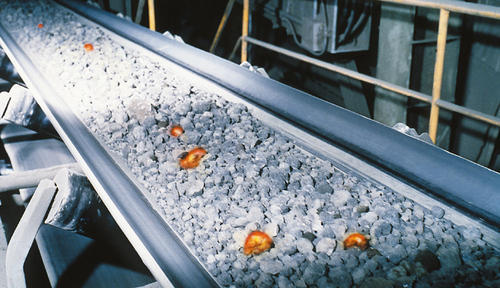Innovative Solutions for Industrial Challenges: The Advantages of Heat-Resistant Conveyor Belts

Image Source: Google
Industrial processes often involve the transportation of materials at high temperatures, which can pose challenges for conveyor belts. Heat-resistant conveyor belts have emerged as an innovative solution to overcome this issue, offering various advantages for industries that operate in high-temperature environments. If you are looking for heat resistant conveyor belt, you can browse Monster Belting.
The Importance of Heat-Resistant Conveyor Belts
Conveyor belts play a crucial role in industrial operations, facilitating the efficient transportation of materials within a facility. However, in industries such as steel manufacturing, mining, and food processing, high temperatures can cause standard conveyor belts to degrade quickly, leading to frequent replacements and downtime. Heat-resistant conveyor belts are specifically designed to withstand elevated temperatures, making them an essential component for industries that operate in hot environments.
Advantages of Heat-Resistant Conveyor Belts
- Enhanced Durability: Heat-resistant conveyor belts are manufactured using special materials that can withstand high temperatures without degrading. This results in a longer lifespan compared to standard conveyor belts, reducing maintenance costs and downtime.
- Increased Reliability: With the ability to withstand heat, these conveyor belts offer improved reliability and performance in high-temperature environments. They are less likely to experience failures or malfunctions, ensuring smooth operations in industrial settings.
- Improved Safety: Heat-resistant conveyor belts can prevent accidents and injuries caused by belt failures due to heat exposure. By using belts that are specifically designed for high temperatures, industries can create a safer working environment for their employees.
- Cost-Effective Solution: While heat-resistant conveyor belts may have a higher initial cost than standard belts, their durability and longevity make them a cost-effective solution in the long run. Industries can save money on frequent belt replacements and maintenance, leading to overall cost savings.
Applications of Heat-Resistant Conveyor Belts
Heat-resistant conveyor belts find applications in various industries that operate in high-temperature environments. Some common industries that benefit from the use of these specialized belts include:
- Steel Manufacturing: Heat-resistant conveyor belts are essential in steel plants where materials are transported at extreme temperatures during the manufacturing process.
- Foundries: Foundry operations involve handling molten metal, which requires conveyor belts that can withstand heat to ensure the efficient movement of materials.
- Food Processing: In food processing facilities, heat-resistant conveyor belts are used to transport hot food products through various stages of production without causing contamination.
- Mining: The mining industry relies on heat-resistant conveyor belts to transport materials such as ores and minerals in high-temperature environments.
Choosing the Right Heat-Resistant Conveyor Belt
When selecting a heat-resistant conveyor belt for industrial applications, it is essential to consider the following factors:
Temperature Range
Ensure that the conveyor belt can withstand the specific temperature range of the operating environment to prevent premature wear and damage.
Material Composition
Choose a belt made from materials such as rubber, neoprene, or synthetic fibers that offer high heat resistance and durability.
Application Requirements
Consider the specific requirements of the application, such as belt speed, load capacity, and type of materials being transported, to select the most suitable heat-resistant conveyor belt.
Maintenance and Service Life
Opt for a conveyor belt that requires minimal maintenance and has a long service life to ensure uninterrupted operations and cost savings over time.
Conclusion
Heat-resistant conveyor belts are a valuable innovation that offers numerous advantages for industries facing challenges related to high temperatures. By investing in these specialized belts, industrial facilities can improve efficiency, safety, and reliability in their operations, ultimately leading to cost savings and enhanced productivity. When choosing a heat-resistant conveyor belt, it is essential to consider factors such as temperature range, material composition, application requirements, and maintenance needs to ensure optimal performance. With the right conveyor belt in place, industries can overcome the hurdles posed by heat and operate smoothly in even the hottest environments.
